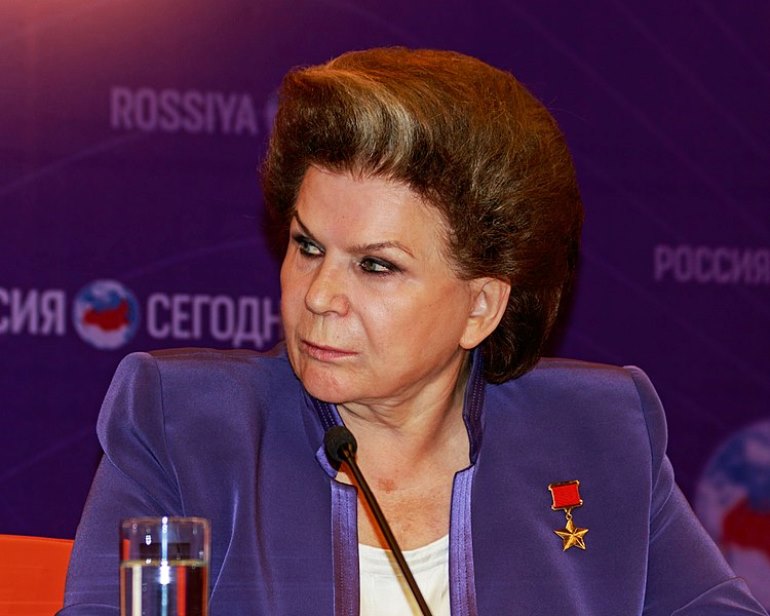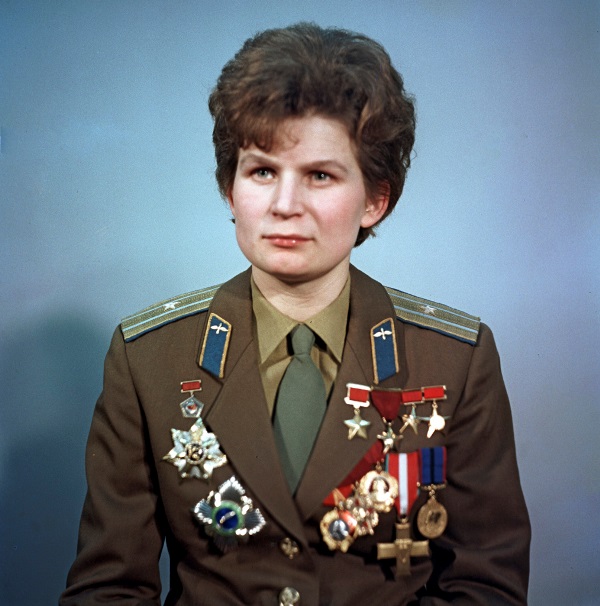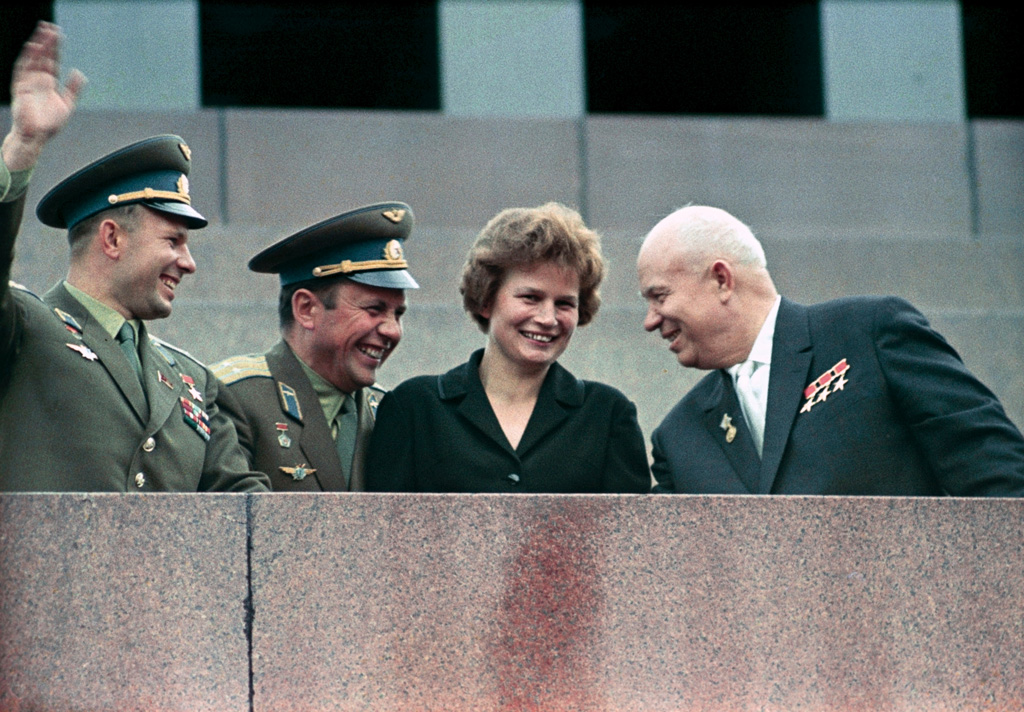
The Woman and the Sky
/ Главная / Russkiy Mir Foundation / Publications / The Woman and the SkyThe Woman and the Sky

Valentina Tereshkova. Photo credit: Wikimedia Commons
Valentina Tereshkova’s name is well-known all over the world. On March 6, she celebrates her 85th birthday. Her achievements as the first female cosmonaut and the only one to have made a solo flight into space at the age of 26 are still unchallenged. Valentina Tereshkova has been serving her homeland her entire life that can be safely considered to be long, fulfilling, and productive one. She was quite literally the USSR’s soft power in the international arena for many years.
That move by our country was a very powerful one indeed: after the world's first pilot cosmonaut, it sent the first female cosmonaut into space. As contemporary people, we may assume that such a thread of thought should have been quite natural and that women can be equally successful in this field as men are.
However, in the early 1960s, it was a revolutionary idea. Just think about it. Until 1961, it was impossible for a woman to be a member of any jury in the United States. In terms of legislation, it was assumed that only men could make decisions. Women were allowed the right to vote at the federal level in Switzerland only in 1974. It happened in Liechtenstein in 1984. Before 1974, a European woman had no right to open a bank account without her husband's consent. Until 1977, the Federal Republic of Germany had a law that required a woman to ask her husband's permission to get employed.
Here we are referring to countries that are now commonly regarded as developed ones. When it comes to women's rights, the Soviet Union was decades ahead of Western countries, especially in terms of wages. There were no gender-related differences in salaries for the same work in the Soviet Union. Meanwhile, in other countries, men's and women's wages were substantially different.
It was against the above background and following successful flights of our cosmonauts that the chief spacecraft designer Sergei Korolev made the decision to recruit a female flight team. And his decision proved to be a wise one.
After Yuri Gagarin's successful flight, the whole world simply fell in love with this charming Russian man and his dazzling smile. Next, it was essential to find the appropriate female character. Korolev and his comrades of higher ranks had a perfect understanding that a young, pretty, and capable of communicating her thoughts Russian woman would become the world's top star after her successful flight into space. She would be the best publicity for the accomplishments of the Soviet Union.

Photo credit: https://ru.citaty.net/
Valentina Tereshkova from the Yaroslavl province drew a winning ticket. She was born in a village in the Yaroslavl Oblast, her father had died in the Soviet-Finnish war when his daughter was only two years old. Her mother raised three children all by herself. It is no wonder that Valentina joined the Yaroslavl tire plant at the age of 17. She used to assemble wheel casings for Belarus tractors. Then she transferred to the factory manufacturing industrial fabrics and went through all the levels of a rank-and-file workshop employee. She was a tape-maker, a roving-maker, a lubricator, etc. She also studied on an extramural basis at a textile technical school and was engaged in public activities as the Komsomol committee secretary at the plant. Furthermore, Valentina was fond of parachuting that was in full swing back then. She had 90 parachute jumps. Her life featured the attributes of the successful pattern of those years. She was a Komsomol member, an athlete, and a beauty. Yet, fate prepared an absolutely incredible gift for her. The sporty girl was selected from several hundred candidates and enrolled in the female cosmonaut corps.

Photo credit: Wikimedia Commons
Why her? Since the first female cosmonaut was intended to be an actual soft power weapon of the Soviet Union, Valentina Tereshkova was the perfect girl. She came from a humble family. Her father was a tank crewman and died at the front. By the way, after Valentina Tereshkova's successful flight, her first request was to help find her father's grave. This was how she responded to the question of how the Soviet Union could thank her for her service. However, she was the one who found his grave on the Karelian Isthmus at the end of the 1980s.
The fact that Valentina became an exempt Komsomol secretary at the plant also played an important role in Korolev's choice. This meant that she knew how to talk to people, find a common ground with them, get along; she was a leader. So, it wouldn't be hard for her to communicate with an unacquainted public, as well.
So, on June 16, 1963, the world's first female cosmonaut took off on the Vostok 6 to conquer space. She spent three days in orbit instead of the planned two. Of course, it was a very challenging experience as a woman's body had its own way of reacting to extreme overloads. Still, Valentina Tereshkova kept the logbook and took photos of the horizon. Her photographs from space became the basis for a whole new scientific trend - the detection of aerosol layers in the atmosphere.
During one of her rare interviews, she confessed that the only thing she had been afraid of at the time of landing was getting into the lake as it seemed embarrassing for the only female cosmonaut to end up in a lake. However, a strong wind carried her safely away from the shore.
Then the former tape-maker and lubricator entered a completely different kind of life. Surprisingly enough, Valentina Tereshkova was also at her best there. She headed the Committee of Soviet Women for 20 years. At the same time, she was vice president of the Women's International Democratic Federation. Sure enough, it was unconcealed jealousy that many women all over the world regarded their female friends in the USSR as the latter were achieving the most incredible heights in all professional arenas back then. Thus, Valentina Tereshkova became the all-round female face of the Soviet Union, the country that promoted equality between people in fact rather than in word. For many years Valentina Tereshkova headed the Union of Soviet Societies of Friendship and Cultural Relations with Foreign Countries, which was renamed the Russian Center for International Scientific and Cultural Cooperation after the collapse of the USSR.

Photo credit: Wikimedia Commons
Valentina Tereshkova has been a deputy of the State Duma from Yaroslavl Oblast for the last few years. According to her fellow countrymen, she has done a lot for the improvement of small towns in her native region. It's gratifying that even at the age of 85 she is still on duty and has all the power for it.
New publications

 Mikhail Kalatozov, a director who transformed the world of cinematography in many ways, was born 120 years ago. He was a Soviet film official and a propagandist. Above all, he was capable of producing movies that struck viewers with their power and poetic language.
Mikhail Kalatozov, a director who transformed the world of cinematography in many ways, was born 120 years ago. He was a Soviet film official and a propagandist. Above all, he was capable of producing movies that struck viewers with their power and poetic language.  Ukrainian authorities have launched a persecution campaign against the canonical Ukrainian Orthodox Church (UOC), the biggest one in the country's modern history. Over the past year, state sanctions were imposed on clergy representatives, searches were conducted in churches, clergymen were arrested, criminal cases were initiated, the activity of the UOC was banned in various regions of the country, and monasteries and churches were seized.
Ukrainian authorities have launched a persecution campaign against the canonical Ukrainian Orthodox Church (UOC), the biggest one in the country's modern history. Over the past year, state sanctions were imposed on clergy representatives, searches were conducted in churches, clergymen were arrested, criminal cases were initiated, the activity of the UOC was banned in various regions of the country, and monasteries and churches were seized.  When Nektary Kotlyaroff, a fourth-generation Russian Australian and founder of the Russian Orthodox Choir in Sydney, first visited Russia, the first person he spoke to was a cab driver at the airport. Having heard that Nektariy's ancestors left Russia more than 100 years ago, the driver was astonished, "How come you haven't forgotten the Russian language?" Nektary Kotlyaroff repeated his answer in an interview with the Russkiy Mir. His affinity to the Orthodox Church (many of his ancestors and relatives were priests) and the traditions of a large Russian family brought from Russia helped him to preserve the Russian language.
When Nektary Kotlyaroff, a fourth-generation Russian Australian and founder of the Russian Orthodox Choir in Sydney, first visited Russia, the first person he spoke to was a cab driver at the airport. Having heard that Nektariy's ancestors left Russia more than 100 years ago, the driver was astonished, "How come you haven't forgotten the Russian language?" Nektary Kotlyaroff repeated his answer in an interview with the Russkiy Mir. His affinity to the Orthodox Church (many of his ancestors and relatives were priests) and the traditions of a large Russian family brought from Russia helped him to preserve the Russian language.

 The leaders of the Friends of the Great Russia cultural association (Amici Della Grande Russia) in Italy believe that the Western policy of abolishing Russian culture in Europe has finally failed. Furthermore, it was doomed to failure from the beginning.
The leaders of the Friends of the Great Russia cultural association (Amici Della Grande Russia) in Italy believe that the Western policy of abolishing Russian culture in Europe has finally failed. Furthermore, it was doomed to failure from the beginning.  Name of Vladimir Nemirovich-Danchenko is inscribed in the history of Russian theater along with Konstantin Stanislavski, the other founding father of the Moscow Art Theater. Nevertheless, Mr. Nemirovich-Danchenko was a renowned writer, playwright, and theater teacher even before their famous meeting in the Slavic Bazaar restaurant. Furthermore, it was Mr. Nemirovich-Danchenko who came up with the idea of establishing a new "people's" theater believing that the theater could become a "department of public education."
Name of Vladimir Nemirovich-Danchenko is inscribed in the history of Russian theater along with Konstantin Stanislavski, the other founding father of the Moscow Art Theater. Nevertheless, Mr. Nemirovich-Danchenko was a renowned writer, playwright, and theater teacher even before their famous meeting in the Slavic Bazaar restaurant. Furthermore, it was Mr. Nemirovich-Danchenko who came up with the idea of establishing a new "people's" theater believing that the theater could become a "department of public education."  "Russia is a thing of which the intellect cannot conceive..." by Fyodor Tyutchev are famous among Russians at least. December marks the 220th anniversary of the poet's birth. Yet, he never considered poetry to be his life's mission and was preoccupied with matters of a global scale. Mr.Tyutchev fought his war focusing on relations between Russia and the West, the origins of mutual misunderstanding, and the origins of Russophobia. When you read his works today, it feels as though he saw things coming in a crystal ball...
"Russia is a thing of which the intellect cannot conceive..." by Fyodor Tyutchev are famous among Russians at least. December marks the 220th anniversary of the poet's birth. Yet, he never considered poetry to be his life's mission and was preoccupied with matters of a global scale. Mr.Tyutchev fought his war focusing on relations between Russia and the West, the origins of mutual misunderstanding, and the origins of Russophobia. When you read his works today, it feels as though he saw things coming in a crystal ball...